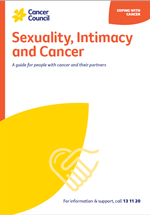- Home
- About Cancer
- Managing side effects
- Sexuality, intimacy and cancer
- Treatment side effects
- Hormone therapy
Hormone therapy
Hormones, which are naturally produced in the body, can cause some cancers to grow. The aim of hormone therapy (also called endocrine therapy or androgen deprivation therapy, ADT) is to lower the amount of hormones the tumour receives. Hormone therapy can be used for a short time or long term to help reduce the size of the tumour and slow down the spread of the cancer.
Side effects of hormone therapy
Anti-oestrogen drugs
| How hormone therapy works | Drugs such as tamoxifen, goserelin and aromatase inhibitors are used in hormone therapy to treat oestrogen- sensitive cancers. Oestrogen encourages some types of breast cancer to grow, so anti-oestrogen drugs can help to slow cancer growth or stop new breast cancers from forming. |
| Possible side effects | Some people have no side effects from these anti-oestrogen drugs, while others experience symptoms similar to menopause, including vaginal dryness or discharge, pain during intercourse, hot flushes, weight gain, decrease in sex drive and arousal, night sweats, urinary problems and mood swings. |
| Importance of ongoing check-ups | You should have regular gynaecological check-ups during and after hormone therapy, as there is a small risk of developing cancer in the lining of the uterus (endometrial cancer) with some drugs. |
Androgen deprivation therapy (ADT)
| What is ADT? | This is a type of hormone therapy that slows the production of testosterone and is used to treat prostate cancer. |
| Common side effects | Side effects include hot flushes and night sweats, weight gain, fatigue and loss of muscle strength, effects on your memory and emotions, breast enlargement and tenderness, loss of bone density (osteoporosis), and increased risk of heart disease and diabetes. |
| Impact on sexual function | When your body is depleted of testosterone, you may find your sex drive decreases, which can also lead to difficulty getting an erection. |
Hormone therapy for cancer can interact with hormones used by some trans and non-binary people as part of gender affirmation. It may also interact with maintenance hormones taken by intersex people. You may not be able to continue with these hormones during your cancer treatment. This can impact on your body image and sense of self. Talk to your doctor about the options and what they mean for you.
→ READ MORE: Immunotherapy and targeted therapy
Podcast: Sex and Cancer
Listen to more of our podcast for people affected by cancer
Dr Margaret McGrath, Head of Discipline: Occupational Therapy, Sydney School of Health Sciences, The University of Sydney, NSW; Yvette Adams, Consumer; Dr Kimberley Allison, Out with Cancer study, Western Sydney University, NSW; Andreea Ardeleanu, Mental Health Accredited Social Worker, Cancer Counselling Service, Canberra Health Service, ACT; Kate Barber, 13 11 20 Consultant, Cancer Council Victoria; Dr Kerrie Clover, Senior Clinical Psychologist, Psycho-Oncology Service, Calvary Mater Newcastle, NSW; Maree Grier, Senior Clinical Psychologist, Royal Brisbane and Women’s Hospital, QLD; Mark Jenkin, Consumer; Bronwyn Jennings, Gynaecology Oncology Clinical Nurse Consultant, Mater Health, QLD; Dr Rosalie Power, Out with Cancer study, Western Sydney University, NSW; Dr Margaret Redelman OAM, Medical Practitioner and Clinical Psychosexual Therapist, Sydney, NSW; Kerry Santoro, Prostate Cancer Specialist Nurse Consultant, Southern Adelaide Local Health Network, SA; Simone Sheridan, Sexual Health Nurse Consultant, Sexual Health Services – Austin Health, Royal Talbot Rehabilitation Centre, VIC; Prof Jane Ussher, Chair, Women’s Heath Psychology and Chief Investigator, Out with Cancer study, Western Sydney University, NSW; Paula Watt, Clinical Psychologist, WOMEN Centre, WA.
View the Cancer Council NSW editorial policy.
View all publications or call 13 11 20 for free printed copies.
